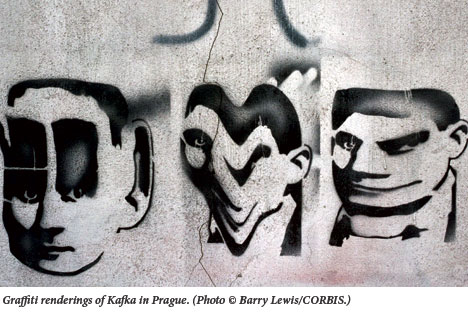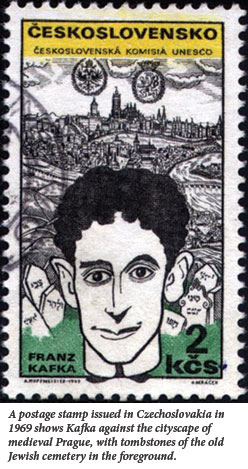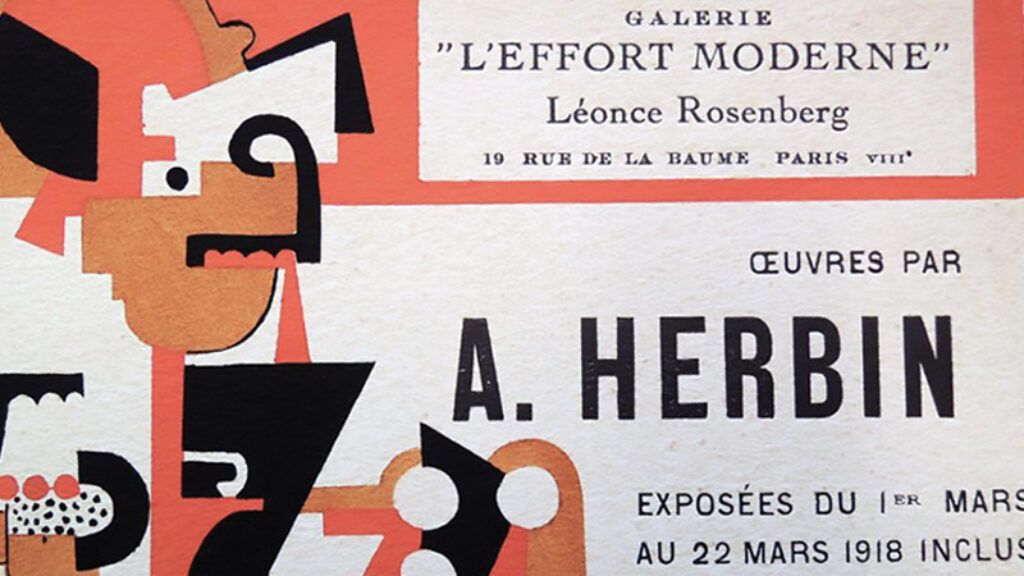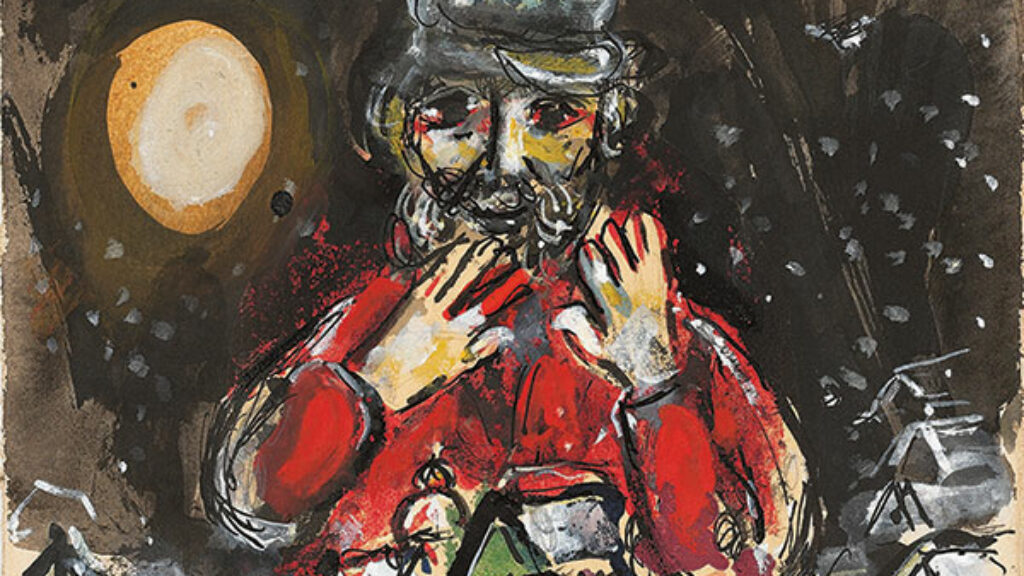Misreading Kafka
“Germany declares war on Russia—in the afternoon, swimming lessons,” Franz Kafka wrote in his diary on August 2, 1914. The line has often been cited as an expression of Kafka’s estrangement from life, of his Weltfremdheit. And why not? After all, the incongruity conveyed in the line jars us like the one we encounter at the beginning of The Metamorphosis, where Gregor Samsa wakes up as a “monstrous vermin” and wonders: How will I ever get to work on time?
But if the famous journal entry feels Kafkaesque, it hardly leaves us with an accurate sense of what Kafka thought about the war. Indeed, a former classmate of Kafka’s recalled seeing him at an early demonstration in support of the war, “looking oddly flushed” and “gesticulating wildly.” Max Brod, his closest friend and most fervent admirer, allowed that within their circle of Jewish literati, Kafka alone had believed the German and Austrian forces would necessarily prevail. So when Kafka put a chunk of his savings into war bonds, he aimed to perform his civic duty and turn a profit.
The timing of the war, on the other hand, couldn’t have been crueler, as Kafka saw it. For months, he had been trying to resolve to quit his job. His plan was to escape its bureaucratic tedium and the scrutiny of his parents, and relocate to Berlin, where he would, or more likely wouldn’t, manage to marry Felice Bauer. In July, Kafka finally made the decision to leave. He even drafted a letter to his parents notifying them that he would finally be moving out (at the age of 31). Now Kafka was stuck in Prague for the foreseeable future.
It could have been worse, of course. Deemed fit to serve, Kafka was spared active duty through the intervention of his supervisors at Prague’s Accident Insurance Institute, who got him categorized as an indispensable worker. With the Institute now understaffed and overwhelmed with new, war-related tasks, Kafka really was indispensable and lost his prized perk: afternoons off. Finding time and psychic energy to write, which had always been a challenge, now became almost impossible. By 1916, Kafka’s literary production had dwindled badly, and he was beside himself. He demanded either a leave or a release into the army. Kafka was demanding, in effect, vacation or death. He got a vacation.
Thus it seems fair to claim that Kafka’s response to the war does, indeed, bespeak a Weltfremdheit, just not quite in the way it is supposed to. We can say much the same thing about many Kafka myths—such as the idea that Kafka’s talent was generally unknown during his lifetime or that his father was a psychological bully. They are sort of true, and this leaves would-be myth-busters in an awkward position. Announcing that you will be overturning an established notion is more exciting than telling readers that you are going to subtly revise one. But in the case of Kafka, more often than not, revising is the activity that makes sense. Unfortunately, in order to present themselves as being properly myth-busting, a number of recent works on Kafka engage in quite a bit of myth-building.
James Hawes, who has a doctorate in German literature but left academia to become a novelist, tells us that his slim volume, Why You Should Read Kafka Before You Waste Your Life, “isn’t going to argue that the K.-myth has wildly skewed our view of Kafka and his writings. It’s going to show it—where necessary by using some long-lost dynamite that no one, not even the best modern German scholars, has ever used before.” What is this “spectacularly fake” K.-myth? Among the ten “building blocks” that Hawes lists, in lazy bullet point form, are these:
- Kafka was imprisoned, as a German-speaking Jew in Prague, in a double ghetto: a minority-within-a-minority amid an absurd and collapsing operetta-like empire.
- Kafka’s works are based on his experiences as
a Jew. - Kafka’s works uncannily predict Auschwitz.
- Kafka’s works were burned by the Nazis.
The general idea here is that we’ve made Kafka into a martyred prophet, whose art owes everything to Jewish persecution and marginality. This is laying it on pretty thick. You don’t need to have studied up on late-Habsburg Prague to know that its German-speakers, whose language was that of the Habsburg government, didn’t constitute a beleaguered minority. That Kafka’s writing has his “experiences as a Jew” as its sole cause isn’t really a dominant critical impression. After all, the word “Jew” never appears in his fiction, which is often understood as revealing precisely the plight of the representative everyman. As it happens, Representative Man is the title of one of the first major Kafka biographies. I have, by the way, just provided more evidence to support my point than Hawes gives to underpin the argument of his book.
Hawes tries to illustrate the claim that for many influential readers, Kafka augured Auschwitz, but all he produces is this:
So when a recent biographer (Nicholas Murray) writes with a straight face of ‘the long-standing debate about whether Kafka foresaw the fate of the Jews in Nazi Europe,’ I throw his book across the room.
Hawes’ apoplectics would be hard to take seriously even if Murray were guilty of actual myth-mongering. But because Murray was merely referring to a critical exchange, the histrionics are silly. At the very least, Hawes ought to have brought up the most influential advocates of the Kafka-as-oracle-of-doom position, Ernst Pawel and George Steiner, but of course that would require sustained argument with formidable critics. As to the myth of Kafka’s works falling victim to Nazi book burnings-which I can’t recall having encountered-it sounds like a reasonable historical assumption, rather than “rubbish.”

What, finally, about that dynamite Hawes promises to set off? There is nothing new about the idea that Kafka’s life had its normal features. For many years, critics have been pointing out that Kafka was interested in fashion, the movies, and, as a young man, prostitutes. Nor has the fact that he kept a stash of erotic magazines—or “porn,” as Hawes calls it—gone unnoticed. Yet Hawes acts as though broadcasting this will blow things wide-open. His claim that the source of Kafka’s famous bug figure can be found in the work of Heinrich von Kleist is, in any case, several megatons short of explosive. Kleist has been overlooked, Hawes implies, because critics want to view Kafka as part of Jewish literature, not Western literature. Yet much has been said about Kafka’s debt to non-Jewish authors. Kafka himself improbably remarked that the model for his work Amerika was Dickens: “It was my intention, as I now see, to write a Dickens novel, but enhanced by the sharper lights I would take from the times, and the duller ones I would get from myself.”
In trying to deracinate Kafka’s work, Hawes asserts that “very little in the actual writings should make us think—as so many critics have claimed—that, to understand these stories properly, we need to reach for our Torah or our Hasidic tales. What makes us think this is not anything in his writings but our knowledge of his life.” Well, Kafka did give an eloquent lecture on Yiddish theater (“I want to tell you, ladies and gentleman, how very much more Yiddish you understand than you think you do”), tried to study Hebrew, read Martin Buber, and even visited the Belzer Rebbe and so on, but does any serious critic really claim this? Theodor Adorno famously said that Kafka’s fiction was like “a parable whose key has been stolen,” and it would be nice to know whom the Judeocentric critics are who disagree. When Walter Benjamin (reflecting on his conversations with Gershom Scholem) discussed one of Kafka’s brief parables with Bertolt Brecht, it was Brecht whose reading seemed forced in its determination to avoid the subject of revelation. The exchange was brilliantly discussed by Robert Alter in his 1991 book Necessary Angels, which showed that one could discuss Jewish motifs in Kafka’s work without reducing it to them.
If anyone might be thought to be guilty of over-Judaizing Kafka, it might be Rodger Kamenetz, whose Burnt Books (the newest volume in Schocken’s Nextbook series) compares Kafka with Rabbi Nachman of Bratslav. Rabbi Nachman was the great grandson of the Ba’al Shem Tov, the founder of Hasidism, and a writer of odd, powerful, and parabolic folk-inspired tales himself. Kamenetz is a poet best known for his book The Jew in the Lotus, which chronicles the discussion between the Dalai Lama and leading rabbis on the challenges of exile. Kamenetz has also long been interested in the connection between Kafka and Kabbalah, and teaches a course on the topic at Kafka’s alma mater, Charles University in Prague. But Kamenetz doesn’t try to convince us that Kafka was a kabbalist or a proto-Neo-Hasid. He just wants to put Kafka into conversation with Jewish traditions and theologians. The goal isn’t so much arriving at a “proper” understanding of Kafka as it is mutual illumination.
Following Scholem, Kamenetz wants to read Kafka’s works as employing Jewish forms and motifs (commentary, allegory, the ineffability of revelation) in such a way that, among other things, they offer inspired commentary on the fate of Jewish tradition in modernity. This was Alter’s project, too; and it is hard to see how Kamenetz advances the argument. On the other hand, Alter’s Necessary Angels reads like what it is: a collection of academic lectures. In addition to providing more in the way of biographical storytelling (especially welcome for the non-specialist) and imaginative associations, the prose in Burnt Books is snappier. Here is Kamenetz giving the kind of qualification that, according to Hawes, we never find in “Jewish readings” of Kafka: “What can any reader do, except scare up another ghostly face to haunt Kafka’s literary remains, guided by personal obsessions and projections?” Kamenetz doesn’t go very far beyond such intelligent haunting.
Zadie Smith’s essay “F. Kafka, Everyman” first appeared in The New York Review of Books, and is included in her collection Changing My Mind: Occasional Essays. Like Hawes, Smith tries to make the case for a more “quotidian Kafka.” In doing so, she leans on another young novelist and critic, Adam Thirlwell:
It is now necessary to state some accepted truths about Kafka and the Kafkaesque . . . Kafka’s work lies outside literature: it is not fully part of the history of European fiction. He has no predecessors . . . These fictions express the alienation of modern man; they are a prophecy of a) the totalitarian police state, and b) the Nazi Holocaust. His work expresses a Jewish mysticism, a non-denominational mysticism, an anguish of man without God. His work is very serious. He never smiles in photographs . . . It is crucial to know the facts of Kafka’s emotional life when reading his fiction. In some sense, all his stories are autobiographical. He is a genius, outside ordinary limits of human behavior. All of these truths, all of them, are wrong.
Thirlwell holds Brod responsible for establishing these mistakes, and ridicules the hagiographic excess of Brod’s 1947 biography, its talk of “ultimate things,” “angels” laughing, and Kafka’s “metaphysical smile.” Smith is fully on board with this. She writes, “These days we tire of Brod’s rough formulations: for too long they set the tone. We don’t want to read Kafka Brodly, as the postwar Americans did so keenly.”
But have we ever really read so Brodly? It was more than a decade ago that new English translations of Kafka’s major works supplanted the Muirs’ renderings, based on Brod’s German editions. Furthermore, the authority of Brod’s word on Kafka was never self-evident. Despite his commercial success as an author, Brod always had a talent for calling forth critical derision. The Viennese satirist Karl Kraus was probably the first to mock Brod’s literary sensibility via his surname. In 1911, he wrote, “Geist smeared on Brod is Schmalz.” Nor is it true that postwar Americans read Kafka as a Jewish saint. Heinz Politizer’s Franz Kafka: Paradox and Parable, which Time glowingly reviewed in 1952, doesn’t reinforce a single one of Thirlwell’s “Brodish” truths.
On the other hand, if people want to see Kafka as a singular genius and his writings as expressing the alienation of modern man, well, so what? Are such interpretations really so outlandish? What business do we have pronouncing them not simply flawed or superficial, but outright “wrong”? To her credit, Smith gives a candid answer. She allows that behind the desire to debunk Brod’s banal pieties there is a Kafka “purism”—that is, more Kafka reverence.
For Smith, what makes Kafka universal is that he captured quotidian experience. His ability to speak to us all has to do with how well he conveyed the very local alienation of being an assimilated German-speaking Jew in Prague, who didn’t fully “belong” anywhere, rather than with his evocation of some vague modern existential malaise. Making much of Kafka’s famous image of German-Jewish writers sticking “with their back legs” to Judaism and reaching “no new ground” with their front ones, and sounding more than a little pious herself (even as she freely mixes Kafka’s bug metaphors), Smith concludes:
For there is a sense in which Kafka’s Jewish question (‘What have I in common with the Jews?’) has become everybody’s question, Jewish alienation is the template for all our doubts. What is Muslimness? What is Femaleness? What is Polishness? What is Englishness? These days we all find our anterior legs flailing before us. We’re all insects, all Ungeziefer now.
Never mind that Kafka didn’t include himself among those German-Jewish authors whom he saw as flailing about with their anterior legs. Hasn’t Smith once again made Kafka into a prophet—a prophet, that is, of the post-everything age? How is this better than reading him Brodly?

Smith’s essay is primarily an appreciative review of Louis Begley’s biographical volume The Tremendous World I Have Inside My Head. While far less sensationalistic than Hawes’ book, and not as catty as Thirlwell’s writing, Begley’s work also relies on some dubious generalizations to make a case for its own importance. One notable instance comes in the middle of its chapter on Kafka’s Jewish identity. Begley writes that Kafka’s “intermittent self-lacerating and provocative pronouncements,” as well as his oft-mentioned “qualms” about the ability of Jews to write effectively in German, “have been used by scholars to buttress the argument that Kafka was himself a Jewish anti-Semite, a self-hating Jew.”
Begley, by contrast, wants us to see Kafka’s response to the Jewish questions of his day as normal, but his efforts are less than concerted. For example, in commenting on Kafka’s fantasy of stuffing all Jews (himself included) “into the drawer of the laundry chest” and “suffocating” them, Begley writes that the “outburst” was probably just a function of the “fatigue” that stems from living with anti-Semitism. Such exhaustion might account for a desire to achieve individual release, but Kafka is dreaming of genocide, which, obviously, is something else. Maybe he was expressing some kind of self-hatred. Or maybe Kafka’s line, which occurs in a letter to Milena Jesenská, is a provocation meant to elicit a revealing response from his non-Jewish married lover—the attraction Jews held for her fascinated Kafka endlessly.
One thing that Hawes is right about is the importance of Reiner Stach’s masterful German language biography-in-progress, the first two volumes of which devote more than fourteen hundred pages to tracking the last fourteen years of Kafka’s life. When the first installment of Stach’s biography appeared, back in 2002, no full-scale life-of-Kafka had been written in German. In that volume, Kafka: Die Jahre der Entscheidung (available in an English translation by Shelley Frisch entitled Kafka: The Decisive Years), Stach reflects at length on this odd fact and his biographical goals. Stach’s account of his aims gives the reader an early taste of both his modesty and his interpretive good sense: He speaks of having to “anticipate failure,” of the real but limited value of biographical inquiry for understanding Kafka’s prose, and of having as his main end “to explain how a consciousness that is set thinking by everything could evolve into a consciousness that set everyone thinking.” Less satisfying, however, is Stach’s answer to the question of why he has no predecessors writing auf Deutsch. His theory centers on the relative lack of movement in Kafka’s life. Kafka, as Stach writes:
. . . wrestled his whole life with the same problems, and seldom took on a new one. Father conflict, Judaism, illness, the struggles with sexuality and marriage, work, the writing process, literary aesthetics: One doesn’t need to carry out an extended analysis to identify the key themes of this life, which appears so static that one could ask, and one has asked, whether it makes sense to talk of any sort of development here at all.
But if Kafka’s stasis was really so intimidating in this case, then why didn’t it scare off biographers writing in languages other than German? It is true, on the other hand, that the seemingly given character of Kafka’s driving concerns makes it nearly impossible for Stach to achieve his goal of tracing the emergence of Kafka’s “consciousness.” Stach has good reason to brace for failure. But he also shows how much Kafka’s positions on his “burning issues” did, in fact, develop, how much they shifted and evolved over the years—hence the titles “the decisive years” (1910-1915) and “the years of knowledge” (1915-1924), the latter of which is scheduled to appear in English in 2012. Or rather, Stach does this brilliantly, producing as engaging a literary biography as I have read, one that is every bit as good as Leon Edel’s magnificent, multi-volume account of Henry James’ life.
Stach does everything well. His prose is lucid and his learning is vast. Without compromising the flow of his biographical narrative, he manages to work in a wealth of information about both Kafka’s cultural context and the people who mattered in his life. He sketches important life scenes in vivid detail, right through to the drama of Kafka’s last hours, during which he suffered terribly and demanded a lethal dose of morphine.
Moreover, Stach is an astute reader of Kafka’s fiction, and his interpretations generally both point to the connections between life and text, and demonstrate why those links don’t hold out the key to revealing the text’s meaning. Finally, through thick biographical description, Stach shows how Kafka was able to create works that were seen by his circle as being about distinctively Jewish problems, and by other readers as being about “the human condition.” He also effectively addresses the issue of why Kafka was so committed to doing things that way:
Kafka always maintained that literary writing and propagandizing were utterly incompatible. The task of the writer isn’t to discuss what he has experienced, but rather to represent it in the purest form possible—to achieve a kind of “self-forgetting,” as Kafka remarked to Brod . . . Kafka’s aesthetic ideal mandated keeping all the experiential connections in his writings indeterminate: personal, Jewish, or simply “human,” and for this reason he confronted everything explicitly Jewish with a taboo. The concept doesn’t occur in his literary works.
It may be that at the end of Die Jahre der Erkenntnis (The Years of Knowledge) we get a deeper, if less direct, explanation as to why this magisterial work is the first major German Kafka biography. Stach concludes the book with an epilogue that is about the effect of the Holocaust on what had been Kafka’s life world. We are told that if Kafka had managed to survive tuberculosis and, unlike his three sisters, the camps, “he would have recognized nothing at the end of the catastrophe. His world no longer existed. Only his language lives.”
Writing the life of Kafka is, among other things, a special kind of memorialization, one that may be especially difficult to carry out in his language. After all, Kafka is not the only great, much-discussed German-Jewish author of his era whose German biography was either written just recently or remains to be written. This group includes Karl Kraus, Hugo von Hofmannsthal, Siegfried Kracauer, and a host of others. Maybe, then, the Holocaust has mattered in Kafka studies as much as the myth-busters say, just not in the way that it is supposed to.
Suggested Reading

The Art of the Dealer
"What would have happened to us," Picasso wondered, " if Kahnweiler had not had a business sense?"

Screwball Tragedy
Picture a Jewish town, located deep in a Polish forest, that hasn’t received so much as a postcard from the outside world in more than a century. Max Gross conjured it up The Lost Shtetl: A Novel, and the result is both screwball and serious.
Montefiore and the Politics of Emancipation
More than a shtadlan.

Why I Defy the Israeli Chief Rabbinate
Everyone knows that the Israeli Chief Rabbinate is often capricious, needlessly adversarial, and hopelessly bureaucratic. Actually, it’s worse than that. It can’t be abolished any time soon, but its power should be radically diminished.
Comments
You must log in to comment Log In